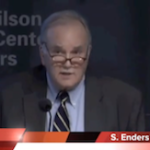BBG Watch
Observers of U.S. international broadcasting outreach managed by the Broadcasting Board of Governors (BBG) federal agency in Washington generally agree that BBG’s surrogate, non-federal broadcasters such as Radio Free Europe / Radio Liberty (RFE/RL) and Radio Free Asia (RFA), are better managed and more mission-oriented than its federal outlet, the Voice of America (VOA). Critics also generally agree that RFE/RL journalists are capable of excellent work, but they point out that the staff is poorly managed and poorly treated, both by RFE/RL’s current interim management and the agency’s bureaucracy in Washington. A former BBG governor called “the leadership problem” at the agency and its media outlets “epidemic.”
 Testifying last week at a hearing before the Senate Committee on Foreign Affairs, former BBG member, S. Enders Wimbush, criticized both the BBG-RFE/RL management and the agency’s response to the propaganda challenge from Russia over events in Ukraine. Mr. Wimbush called the BBG response “feeble.”
Testifying last week at a hearing before the Senate Committee on Foreign Affairs, former BBG member, S. Enders Wimbush, criticized both the BBG-RFE/RL management and the agency’s response to the propaganda challenge from Russia over events in Ukraine. Mr. Wimbush called the BBG response “feeble.”
On BBG’s management of RFE/RL, Mr. Wimbush said:
S. ENDERS WIMBUSH: “A current on-going investigation of possible financial and oversight malfeasance at RFE/RL in Prague, occurring from at least 2013 to the present, which has gained the attention of the OIG, the FBI, and possibly other federal authorities, is probably a low- point in BBG oversight, given that the BBG board knew of the problem at least a year before it acted, and then only weakly. This is a pretty miserable record for such a small agency, which also consistently receives one of the worst rankings in surveys of federal employees’ satisfaction with their place of work.”
On the leadership issue, he said:
S. ENDERS WIMBUSH: “The leadership issue goes top to bottom in U.S. international broadcasting. Kevin Klose, sitting next to me, was the last full-fledged president of RFE/RL. He left 19 months ago, on March 1, 2014, leaving that vital network—now in probably the most challenging environment since the end of the Cold War—under the control of two “acting interim co-managers”—one located in Washington, who has since departed. RFE/RL still has no permanent president, even as its broadcast milieu churns. The VOA has had no director for nearly eight months. The management of the BBG itself, lacking a CEO or any other credible arrangement, was handed to the joint leadership of three executives, two of whom could be described as junior. The leadership problem is epidemic.”
Mr. Wimbush called the BBG’s response to events in Ukraine “feeble.” Much of the BBG’s response to Russian propaganda and disinformation has been led by RFE/RL. Some VOA English Newsroom reporters had complained earlier that “countering” violent extremism or Putin’s propaganda would undermine their journalistic credibility. RFE/RL has more expertise than VOA on Russia-related issues, but not as much as it had during the Cold War. In his congressional testimony, Mr. Wimbush acknowledged the good work of RFE/RL and VOA journalists, but he added that “the BBG’s response to Ukraine leaves much to be desired.”
S. ENDERS WIMBUSH: “Ukraine posed a particularly tough test for the BBG. The BBG’s response to Ukraine has been neither robust nor quick, despite an influx of new taxpayer funds for the purpose. Nearly a year and a half after Russia invaded the Crimea thereby touching off today’s crisis in Ukraine, the BBG was able to produce a single half-hour of new daily programming for placement on local networks in Central Europe, and then only by mostly working around the existing capabilities in the two Russian broadcast services in RFE/RL and the VOA and with an infusion of an additional million dollars from the State Department. Is the BBG telling us this is the best we can do? Clearly it is a feeble response. I am told that the quality of the product is quite good, though it often airs late at night on local networks, and that new programs are now being added. But the BBG’s response to Ukraine leaves much to be desired.”
 In an opinion article, BBG Watch’s regular commentator, The Federalist,” had this to say about the RFE/RL’s 30 minute Russian-language TV program “Current Time.”
In an opinion article, BBG Watch’s regular commentator, The Federalist,” had this to say about the RFE/RL’s 30 minute Russian-language TV program “Current Time.”
THE FEDERALIST: “’Current Time,’ the Russian program. Is this the one, only 30-minute long program, that has been pulled of the air in one country due to poor ratings, and is broadcast in other countries only late at night? Come on. The Russians have the upper hand in its own narrative. And they can do it 24/7 compared to whatever miniscule effort is being made by VOA or RFE/RL. That’s something that the senators hopefully took note of.”

It is true that RFE/RL journalists have not been idle and have responded to Russia’s challenge within their means. The question is whether this is enough.
RFE/RL journalists cannot answer this question. They are doing whatever they can with what they have.
Critics argue that RFE/RL reporters and analysts do not have sufficient resources because of poor management at the BBG level and do not have proper guidance and are not well treated because of poor leadership or lack of it.
Critics have pointed out that while Radio Liberty journalists working in Putin’s Russia are risking their future employment prospects and perhaps safety by exposing official corruption, some have been arbitrarily dismissed by Radio Liberty Russian Service management and left to fend for themselves. One Radio Liberty’s human rights reporter, Kristina Gorelik, who is still a target of vicious anti-Semitic attacks by Russian nationalists for her previous work at Radio Liberty, had to defend herself in a Russian court against attacks from RFE/RL lawyers and a Radio Liberty manager. Instead of receiving protection, she was fired under what many of her supporters in the Russian human rights community view as a false pretext indicative of poor management.
RFE/RL does not comment on ongoing legal disputes. On the more narrow question of Russian-related programming, however, RFE/RL management and public relations specialists disagree with The Federalist and other critics. They reject descriptions of RFE/RL’s response to the Russian propaganda and disinformation challenge as being “feeble,” but they do acknowledge that more can be done and be done better.
“…to base the total of RFE/RL’s response to Kremlin-aligned media on the length of ‘Current Time’s’ daily show is not fair to the work being done either by CT or by other units throughout the organization,” RFE/RL’s Deputy Director of Communications & External Affairs Martins Zvaners said.
He added:
“Can more be done – certainly. And we certainly plan to continue to do more, and to do better. But what we’re already doing is worthy of recognition.”
BBG Watch has received this extensive response from RFE/RL:
Response from RFE/RL’s Deputy Director of Communications & External Affairs Martins Zvaners
In “The Federalist’s” review of Tuesday’s SFRC hearing on BBG reform (https://bbgwatch.com/business-versus-policy-experience-thoughts-on-reform-of-u-s-overseas-broadcasting/) some assertions are made about RFE/RL’s contributions to providing alternative Russian-language content to that being produced by Kremlin-aligned media, which do not reflect what has in fact taken place.
First, it is understandable that the BBG would trumpet “Current Time” (CT, http://www.currenttime.tv), as it is a joint RFE/RL-VOA project that was stood up from close to scratch, which in the past year has earned the trust of a significant audience as well as the concern of Kremlin media that have done several stories on the project to try and undermine its credibility among Russian-speaking audiences – see the clip on CT from the RFE/RL “deep dive” in July (https://youtu.be/tinDQGpRvn4?t=3m23s). Preliminary research is showing that Current Time, which of course cannot be broadcast domestically in Russia, has nonetheless gained a weekly web and satellite audience of at least 2 million people age 15 and older. But that’s not the only example of new Russian-language content, even for the CT team.
In May, two weekend shows were launched under the CT brand – one produced by VOA, the second by RFE/RL (http://www.rferl.org/content/current-time-expanding-in-eastern-europe/27026069.html). RFE/RL also launched a Central Asia-focused edition of CT in September (http://www.rferl.org/content/current-time-asia-new-program-facts-not-lies-to-central-asia/27334401.html), and is preparing to launch a Caucasus-focused edition in the coming months. CT also recently debuted a powerful 38-minute video documentary on the last days of the battle for “Airport Donetsk” (http://www.currenttime.tv/airportdonetsk) that is getting great reviews at film festivals.
CT is available on 25 affiliates in 9 countries (1 affiliate in Latvia, 3 in Lithuania, 6 in Ukraine, 1 in Moldova, 2 in Georgia, 1 in Kazakhstan, 2 in Kyrgyzstan, 1 in Tajikistan; 1 in Israel), as well as by satellite in Russia, RTVi in the U.S., and web affiliates in Azerbaijan, Belarus, Lithuania and Ukraine. In the case of the affiliate you refer to that allegedly “pulled [CT off] of the air…due to poor ratings,” the ratings would have been difficult to assess as the show was allowed to air by the affiliate for less than two weeks; that same affiliate continued to stream the program via its online portal for months afterwards. As for airtimes – many of CT’s affiliates have moved the program to earlier air times, or to be in proximity to their prime news programs, as they gained confidence in the credibility and appeal of the program and brand.
CT and its associated digital reporting and engagement group (DIGIM) are ramping up their activities, especially since USIM received its FY2015 budget funding following Congressional approval of BBG’s FY2015 program plan in May. DIGIM includes several operational units (all Russian-language focused), including:
- SOCIAL MEDIA: Generating social media content and promotes RFE/RL content.
- MOBILE VIDEO: Developing a mobile site that presents the best of RFE/RL and other video.
- FOOTAGE vs FOOTAGE: A regular video product featured in “Current Time” and on digital platforms, “Smotri v oba” (Look at Both; http://www.currenttime.tv/archive/look-sharp/latest/19722/19722.html) compares and contrasts how Russian media and other media report on the same events, providing the facts of a case and pointing out inconsistencies in Russian reporting.
RFE/RL just launched two mobile apps designed for “Current Time” audiences — “Puls Vremeni,” a constantly updated news app curated by “Current Time” editors, and “Video,” a curated feed of “Current Time” videos that also provides an easy way for users to share their own videos with “Current Time” – which are now live in both the Apple and Android app stores.
In September, RFE/RL launched a wire service for Central Asia in the Russian, Kazakh, Kyrgyz and Tajik languages (http://www.centralasian.org). As of October 30, more than 500 media outlets in Central Asia (Kazakhstan, Kyrgyzstan, Tajikistan) had subscribed to the daily service, which offers news and other information as an alternative to Russian news services that until now have dominated the Central Asia information space.
In addition, existing RFE/RL language services such as the Russian Service, Ukrainian Service, and Moldovan Service have all added new programs and new content streams to address the challenge of Kremlin-aligned propaganda; here are just a few examples:
- In March 2014, with State Department support, the Ukrainian Service launched a website for Crimea called “Crimea.Realities” in Russian (http://ru.krymr.com/), Ukrainian (http://ua.krymr.com/) and Crimean Tatar (http://ktat.krymr.com/).
- The Ukrainian Service acts as a “Brussels bureau” that provides regular reporting for Ukrainian television stations, including 1+1, ICTV, and Channel 24. Reports also are being carried on national First Ukrainian Television two or three times weekly.
- In the past year the Ukrainian Service has launched six new television programs:
o “Donbas.Realities” – a 15-minute program in Russian that covers events in restive eastern Ukraine and airs twice a week on Donbas TV, Espreso TV and First Ukrainian TV.
o “Crimea. Realities” – a 20-minute program in Ukrainian (Russian-speaking participants are not translated) airs on Saturdays on news TV channel “24.”
o “Schemes” – a joint weekly program of RFE/RL’s Ukrainian Service and Ukraine’s First National TV channel in Ukrainian (Russian-speaking participants are not translated), airs every Thursday at 21:50 on First National (UT-1).
o “We Together” – a 20-minute program in Ukrainian (Russian-speaking participants are not translated) dedicated to issues in different Ukrainian regions and helps connect these regions to the capital, Kyiv, airs twice a week on First Ukrainian TV and Espreso TV.
o “Your Liberty” – a daily 20-minute program in Ukrainian (Russian-speaking participants are not translated) airs twice a week on Espreso TV.
o “Saturday Interview” – a 20-minute program in Ukrainian (Russian-speaking participants are not translated) airs every Saturday on Espreso TV.
- “Rus2Web” (http://www.rus2web.com) aggregator service curated by the Russian Service offers a Russian-language platform that combines quality media and social media news and discussions. Rus2Web collects in one place information from local activists and journalists who increasingly do not have support and ability to publish their materials other than in social media.
- The Russian Service premiered “Roads to Liberty,” an Internet TV talk show produced in Kyiv and hosted by journalist Vitaly Portnikov. The show examines common issues facing Russia, Ukraine and other post-Soviet countries as they continue their transitions from communist rule.
- The Moldovan Service continues to expand Russian-language content:
o In November 2014, the Moldovan Service premiered a 10-minute television program, “Pur si Simplu” (“Clear and Simple”) that airs twice a day on the national public TV channel “Moldova-1” – first in Romanian, then in Russian. It is among the top five programs on Moldova-1, watched by more than 200,000 people daily.
o The Moldovan Service’s “Dialogues” weekly program for the separatist region of Transnistria was doubled to 30 minutes in Russian and 30 minutes in Romanian, and is carried by Moldovan Public Radio and Radio Novaya Volna, the Service’s only affiliate in Transnistria. A related Russian web page was also expanded.
o Once a month the Moldovan Service’s Sunday round-table discussion „Punct si de la capat” („Full stop. New Paragraph”) is now produced in Russian. The program is carried by Public Radio in Moldova. Video program highlights also are published on line. The program is translated into Romanian on RFE/RL’s Moldovan website.
- “Ekho Kavkaza” is a daily 1-hour program in Russian broadcast as a part of 18-hour daily nationwide FM network broadcast in Georgia from Monday to Sunday. Within that same stream, the Georgian Service airs two 1-hour Russian Service programs (“Face the Event” and “Over the Barriers”) every day, along with other content drawn from RFE/RL and VOA Services (http://www.rferl.org/content/release-rferl-voa-partnership-boosts-georgian-broadcasts/25376894.html).
- The Kyrgyz Service is producing daily, 3-minute TV news roundups in both the Kyrgyz and Russian languages that air on the national KTRK television channel.
So, to base the total of RFE/RL’s response to Kremlin-aligned media on the length of “Current Time’s” daily show is not fair to the work being done either by CT or by other units throughout the organization. Can more be done – certainly. And we certainly plan to continue to do more, and to do better. But what we’re already doing is worthy of recognition.
Comments are closed.